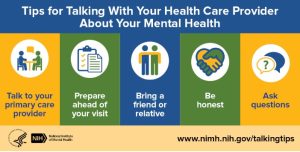
1) Talk to your primary care provider
Your mental health is part of your overall health. When you visit your doctor, they may ask you a lot of questions, but not about your mental health. Speak up! Tell them what you are experiencing. Your primary care provider will be able to direct you to mental health specialist.
2) Prepare for your visit.
Seeing a doctor for any reason can be stressful. Additionally, we know that our time with our specialist is limited. Make a list ahead of time of all the medications you are currently taking, along with the doses. You may wish to bring a list of medications that you have been on which were ineffective if applicable. If you have a family history of any types of illness, make a note of who was diagnosed with what. If you suspect there was mental illness, but no diagnosis, in your family medical history, explain what makes you believe this. Most importantly, write out the questions that you have that you feel you need answers to. By preparing thoroughly, you make the most of your time with your health care professional and ensure they have the best background information you can provide.
3) Bring someone with you.
If you feel comfortable, bring a friend or relative. Many times there is a great deal of information provided, referral appointments and/or lab tests may be ordered. By bringing someone with you, you help make sure that you get all the information. It’s also comforting to have support with you.
4) Be honest.
Telling your doctor the truth is crucial. Your health care providers cannot help you if you do not disclose symptoms or minimize them. Remember, talking to your doctor is safe. What you tell your health care provider is confidential and may not be revealed to any one you have not authorized. If you have experienced any major life experiences, be sure to inform your care givers as these experiences may be affecting you.
5) Ask questions.
Remember those questions you wrote up before your visit? Make sure they are all answered to your satisfaction. Do you have more questions? Make sure you ask them! If your health care provider gives a diagnosis or a treatment that concerns you, voice those concerns. If you still are uncomfortable with the diagnosis and/or treatment plan, seek another opinion from a different provider. Mental health issues in particular are not “one-size-fits-all” in terms of treatment. Treatment often requires a lot of trial and error. It’s during this trial and error phase that you absolutely must share side effects with your care giver.
This material was adapted from the National Institute of Mental Health
Source: https://www.nimh.nih.gov/health/publications/tips-for-talking-with-your-health-care-provider/index.shtml
retrieved on December 31, 2019.


